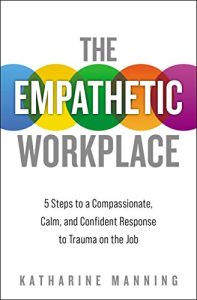Join getAbstract to access the summary!

Join getAbstract to access the summary!
Katharine Manning
The Empathetic Workplace
5 Steps to a Compassionate, Calm, and Confident Response to Trauma on the Job
HarperCollins Leadership, 2021
What's inside?
Help your employees handle work and life difficulties with the LASER approach to bringing empathy to work.
Recommendation
Employees perform better in a supportive corporate environment, but disruptive events – illness, domestic abuse, crime, accidents – can displace people’s lives and upset your team dynamics. Attorney and organizational crisis counselor Katharine Manning explains that companies become stronger when leaders offer employees understanding and trust during difficult times. With active listening and understanding, you can help your team members gain control of their situation and open the door to solutions.
Summary
About the Author
Katharine Manning is a counselor and legal adviser on victim issues. She served as a senior attorney advisor with the US Justice Department on victim responses to such crises as the Boston Marathon bombing.



















Comment on this summary